Regain Control of Your Life through Compassionate OCD Treatments
Obsessive-Compulsive Disorder (OCD) is a serious disorder that can impact your everyday life, including school, work, relationships, and even simple, daily functions.
While OCD is treatable, it is unfortunately often undiagnosed or misdiagnosed. Whether you have received an OCD diagnosis or think that you may have OCD, we want to help you find a way forward.

How can I tell if I have OCD?
OCD is typically a lifelong disorder, and the severity of symptoms and the types of obsessions or compulsions one might have can fluctuate depending on the person and their environment.
Overall, OCD symptoms usually get worse during times of stress. Severe symptoms are often so distressing and time-consuming that you can’t perform necessary functions. However, even if symptoms of OCD aren’t severe, they may still be excessive and take a great deal of time and energy as well as impact a person’s daily life and relationships.
What is OCD? Are there different types of Obsessive-Compulsive Disorder?
Obsessive-Compulsive Disorder is a type of anxiety disorder characterized by excessive unwanted thoughts, urges, images, or fears (obsessions) that are distressing to the person experiencing them. These types of obsessions and compulsions can and most often do impact the functioning of the person’s everyday life.
To alleviate struggles caused by OCD, the person often engages in physical and/or mental repetitive behaviors (compulsions). These compulsions, while temporarily alleviating distress in the short term, reinforce the OCD. Unless it is stopped, this cycle will lead to a worsening of OCD over time.
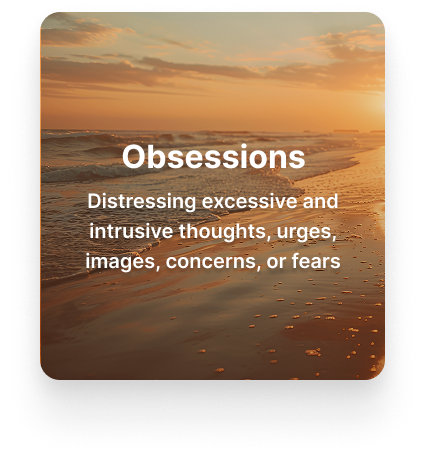
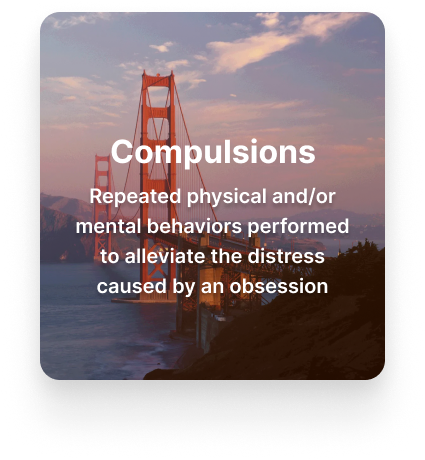
OCD Treatments That Help You Find Peace
At Mindful Health Solutions, we offer the most advanced and effective evidence-based treatments for OCD all under one roof. Together, we will find a treatment that helps you finally find relief.
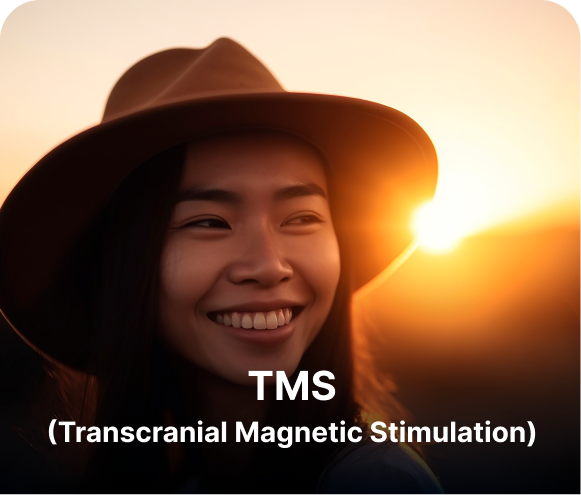
TMS for OCD is a safe, non-invasive procedure that uses magnetic pulses to stimulate the brain. It’s the first and only drug-free therapy to be FDA-approved for OCD treatment. Reach out today to learn more about TMS for OCD and how it can help you.
Learn More
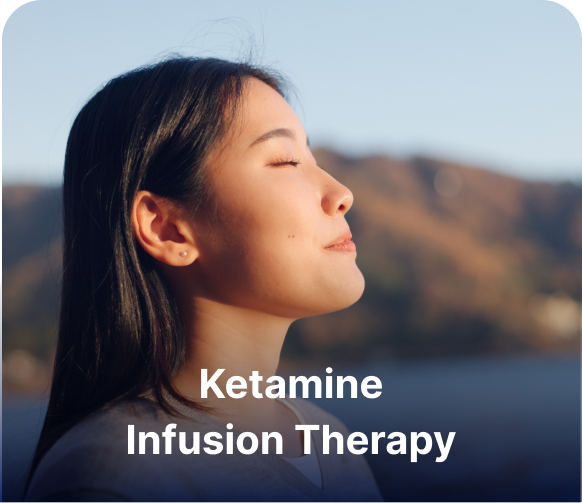
Ketamine Infusion Therapy is an intravenous treatment designed for patients struggling with a number of psychiatric conditions, including major depressive disorder, treatment-resistant depression, bipolar depression, PTSD and trauma disorders, post-partum depression, anxiety, and OCD.
Learn More

SPRAVATO (Esketamine) is a safe, non-invasive treatment that is thought to create new connections in the brain. It’s the first and only FDA-approved treatment for depression that targets the glutamate system. It may also be an effective treatment for OCD.
Learn More
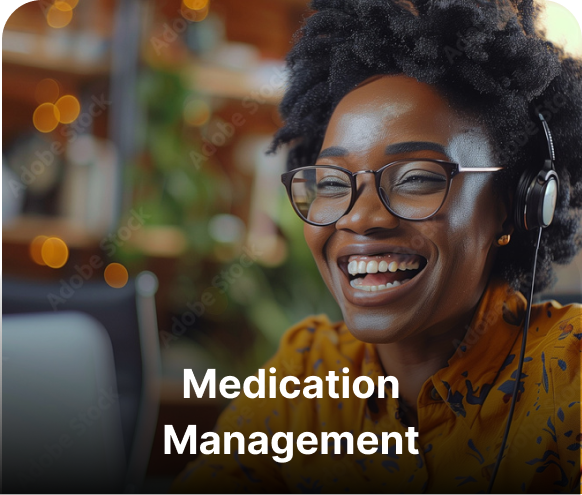
Proper medication management care ensures that you receive the most effective and appropriate medications for obsessive-compulsive disorder and other mental health conditions. Our psychiatrists work closely with all patients to monitor and adjust medication for OCD as needed.
Learn More
Why Mindful Health Solutions for OCD Treatments?
OCD is a very specific and unique kind of anxiety disorder. At Mindful Health Solutions, our multi-disciplinary providers have had specific training in OCD care alongside other mental health conditions, meaning they are well-equipped to support you in your recovery journey. More, Mindful Health Solutions providers bring with them a strong internal network where they help support one another and each other’s patients.
At all times, you can be sure that our team will work hard to make sure you receive the best care. We will first determine an accurate diagnosis and identify if you have any other co-occurring disorders. Next, your provider team will discuss the best treatment options for your unique needs, whether that is OCD therapy, medication, and/or other innovative and alternative treatments. We pride ourselves on using the best up-to-date and evidence-based treatments for our patients.
Overall, we understand the importance of patient-centered care and understand that one size does not fit all when it comes to mental health treatment. Patients respond well to the dynamic menu of treatments we offer, which includes traditional medication management as well as cutting-edge alternatives.
Mindful Health Solutions also wants to make treatment comfortable and accessible. We offer telepsychiatry if patients are physically unable to come into the office or prefer a virtual appointment. This option allows patients to get care from wherever they are in the state. We also foster a strong culture of Diversity, Equity, and Inclusion. Our therapists strive to embody a sense of awareness, respect, and humility with regard to cultural differences. And last but not least, we accept most major insurances.
Frequently Asked Questions
How can I tell if I have OCD?
Obsessive-Compulsive Disorder is a type of anxiety disorder that is characterized by excessive unwanted thoughts, concerns, and fears (obsessions) that may lead to repetitive behavior (compulsions). These thoughts and behaviors may be unreasonable and fear-based, and often trigger intense distress that gets in the way of everyday functioning and managing the tasks of everyday living.
OCD is typically a lifelong disorder that may start in childhood but more likely begins during the teen or young adult years. With it being a lifelong disorder, the severity of the symptoms and the types of obsessions and compulsions one might have can fluctuate. Overall, symptoms usually get worse during times of stress. Severe symptoms are often so distressing and time-consuming that you aren’t able to perform necessary functions. However, even if symptoms aren’t severe, they may still be excessive and take a great deal of time and energy as well as impact your daily life and relationships.
The obsessions and compulsions that may be experienced when having OCD usually revolve around a theme. For example, one theme could revolve around the fear of a tragedy. An obsessive thought that might center around this theme is a fear of causing harm to loved ones, others, or yourself by accidentally causing your house to catch on fire. Because of this obsessive thought, you compulsively and repeatedly check that the stove is off. There are a wide variety of themes present within OCD, and these themes, like obsessions and compulsions, can fluctuate throughout your life.
The symptoms of OCD typically include having obsessive thoughts that result in compulsive actions surrounding themes such as:
- Contamination Fears / Washing Compulsions
- Body Dysmorphic Disorder (BDD / appearance-related obsessions)
- Social Anxiety
- Phobias (fear of animals, flying, vomiting, leaving home, freeways, etc.)
- Panic Disorder (fear of panic attacks)
- Hyper-Responsibility OCD / Checking (fear of making a mistake or causing a tragedy)
- Hypochondria (fear of having/getting illnesses)
- Harm OCD (violent obsessions, hit-and-run OCD, fear of causing harm)
- Sexual Orientation OCD (fear of being in denial about sexual orientation)
- Pedophile Obsessions (fear of inappropriate sexual thoughts about children)
- Relationship OCD (obsessions about love and fidelity)
- Religious or Moral Obsessions (Scrupulosity)
- Sensorimotor OCD (fear of consciousness of blinking, swallowing, breathing, etc.)
- Perfectionism
It’s important to note that not all OCD symptoms are listed above, and it is very possible to struggle with a theme that isn’t present. Also, it is possible to have OCD if you only have obsessive thoughts or only do compulsive, repetitive actions. You do not have to do both in order to be diagnosed with OCD.
It is important to get an OCD diagnosis from a trained professional. Only once a diagnosis has been made should you work with your doctor to determine an appropriate and comprehensive treatment plan that works for you.
If you think that you or a loved one is struggling with OCD, let us help. Go to our Contact Us page and reach out to us in a way that is comfortable for you. Together, we can find a path forward.
What is the goal of OCD treatment?
OCD is characterized by excessive thoughts and compulsions that may lead to repetitive behavior. These thoughts and compulsions may be unreasonable and fear-based, often triggering intense distress that gets in the way of everyday functioning and managing the tasks of everyday living.
Unfortunately, OCD is often misdiagnosed, or not diagnosed until someone has suffered for many years. If you think you or someone you care about may have OCD, it is important to be assessed by a provider intimately familiar with OCD and its many variations to get an accurate diagnosis and appropriate treatment recommendations.
Mindful Health Solutions’ treatments for OCD focus on offering comprehensive evaluation and evidence-based treatment approaches. Our treatment plans include discussion of various medication approaches, brain stimulation options such as TMS, reading or self-learning recommendations, lifestyle modifications, education to you and your family about the diagnosis, as well as helping to connect you to other OCD-specialized individual therapists or groups.
We want to help patients to rise above their OCD. Our certified and professional doctors want to work with patients to free them from the burden of OCD with the most innovative, effective, non-invasive, and evidence-based therapies available.
If you think that you or a loved one is struggling with OCD, or you're wondering what is the best treatment for OCD, let us help. Together, we can find a path forward.
What is TMS for OCD and who should consider it?
TMS stands for Transcranial Magnetic Stimulation. It is a safe, non-invasive, non-medication treatment for clinical depression that uses magnetic fields to stimulate the specific part of the brain known to control mood. It has proven to be effective for people with OCD.
TMS is used on people with mental health conditions that have not seen success with medications and/or antidepressants. TMS has extremely limited side effects, especially when compared to traditional medications and antidepressants, so it is also a treatment option for people who may be suffering from side effects while trying to experience relief from their condition.
Many patients find that TMS as an OCD treatment is an amazingly effective therapy option. The FDA labeled TMS therapy to be marketed as a treatment for clinical depression in 2008. In 2018, TMS therapy with the Brainsway Device was cleared by the FDA, and in 2020, the MagVenture Coil was also cleared. Both the Brainsway Device and MagVenture Coil are intended for OCD treatment.
TMS therapy is often administered in conjunction with other types of treatment, such as psychotherapy or (possibly continuing) medication management. At Mindful Health Solutions, our expert providers will work with you to create the best treatment plan for your specific needs.
